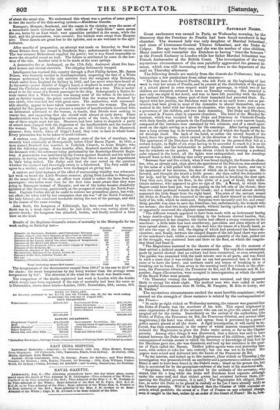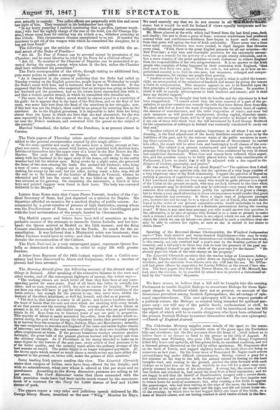POSTSCRIPT.
SATURDAY NIGHT.
Great excitement was caused in Paris, on Wednesday morning, by the discovery that the Dutchess de Praslin had been found murdered in her chamber. The deceased lady was only daughter of Marshal Sebastian and niece of Lieutenant-General Tibnrce Sebaatiani, and the Duke de Coigny. Her age was forty-one, and she was the mother of nine children. Many readers will remember the Dutchess as having " done the honours " at the French Embassy in London while her father Marshal Sebastiani was French Ambassador at the British Court. The investigation of the very mysterious circumstances of the case painfully aggravated the general in- terest, which was still increasing every hour down to the departure of the mail on Thursday afternoon.
The following details are mainly from the Gazette des Tribunaux; but we interpolate a few particulars from other sources-
" The Dat hess de Choiseul-Praslini who left Paris at the beginning of last week to visit her estate of Praslin, and be present at the distribution of the prizes of a school placed in some respect under her patronage, in which two of her children are educated, returned to town on Tuesday evening. She intended to pass only one night in her hotel, and was to have left yesterday with the Duke her husband for Dieppe, where part of their household had preceded them. Fa- tigued with her journey, the Dateless went to bed at an early hour; and as per- mission had been given to most of the domestics to absent themselves, she re- mained in the hotel with her femme-de-chambre, who sleeps in the story above, a governess of the children, and two male domestics. The Duke and Dutchess, as is usual in France, slept in separate chambers. The hotel of the Marshal Sel bastiani, which was occupied by the Duke and Dutchess de Choiseul-Praslin with their family, only presents on the Faubourg St.Honore a very narrow facade, composed of the entrance-door sustained by two columns and of a small apart- ment on the right serving as a place for the concierge. After having passed the door a long avenue has to be traversed, at the end of which the facade of the ho- tel develops itself. The back of the hotel, or rather the second façade of the hotel, faces the gardens, which extend in the direction of the Champs Elysees. The apartment of the Dutchess de Praslin, situated on the ground-floor but at a certain height, (a flight of six steps having to be ascended to reach it,) is on the second facade; and the bedchamber in particular, situated towards the South, has its windows on the garden. From eleven o'clock in the evening a profound calm reigned in the hotel; all the lights were extinguished; and the concierge himself went to bed, thinking that every person was asleep. "Between four and five o'clock, when it was broad daylight, the femme-de-cham- bre, who, as already said, slept above the apartment of the Dutchess, was awakened by the noise of a bell pulled with violence. She rose in great haste, and ran to the apartment of her mistress, the door of which she in vain tried to open. She listened, and thought she heard a feeble groan; she then called the domestics to her help, and by uniting their efforts they succeeded in breaking the door open. They then saw, lying on the floor, in the midst of a pool of blood, their or- tousle mistress, who appeared to give no sign of life. A Itound, in which three fingers could have been put, was seen gaping on the left side of the throat; there were two other profound wounds in the breast; and a fourth had almost entirely separated the little finger from the right hand. The cries of the servant roused the Duke de Praslin; who hastened to the spot, and threw himself on the bleeding body of his wife, which be embraced. Surgeons were instantly sent for, and every- thing possible was done to save the Dutchess; but, unfortunately, the wounds were too serious: she died two hours afterwards, without having spoken a single word, or apparently recovered the slightest consciousness.
" The different wounds appeared to have been made with an instrument having a large double-edged blade. Everything in the bedroom showed besides, that, though surprised in her slumber, the victim had offered a strong resistance to the murderer: a little table had been overthrown; porcelains and some objects of art were spread about; the drapery on the wall bore the traces of a bloody hand, as did also the rope of the bell, the ringing of which had awakened the femine-de- chambre; and, finally, between the clasped fingers of the left hand there was some of the murderer's hair, whilst a more considerable quantity of the hair, pulled out in the struggle, was scattered here and there on the floor, on which the coagula- ting blood had fixed it. "The Magistrates hastened to the theatre of the crime. At the moment of their arrival a judicial examination was commenced. The very first examinations made by justice showed that po robbery had been committed, or even attempted. The garden was examined with the most minute care in all parts, and was found in such a state that it was evident that no one had penetrated into it either to enter or to leave the hotel; and nowhere could any traces of breaking in or of breaking out be found. From seven in the morning until five o'clock in the after- noon, the Procureur-General, the Procureur du Roi, and M. Broussais and M. Le- gonidec Juges &Instruction, were occupied in interrogatories, at which the chiefs of the gecret Police were present.
"On Thursday evening the investigations were resumed, and they appeared likely to occupy the whole night. The medical men who were called in under these painful circumstances were M. Orfila, M. Pasqnier, IL Bois de Loury, and M. Tardieu."
The mysterious circumstances excited the most horrible suspicions: what ensued on the strength of those surmises is related by the correspondent of the Times- " So early as eight o'clock on Wednesday morning, the rumour was general that the Duke of Praslin was the murderer of his wife. This report originated in some expressions of those of the servants who ran out to give the alarm and seek surgical aid for the victim. Immediately on the arrival of the authorities, (the Prefet of Police, the Procureur du Roi, the Procureur-General, and several other magistrates,) the hotel was closed, and egress from it prevented by a posse of police agents placed at all the doors. A rigid investigation, it will easily be be- lieved, was then commenced; in the course of which patters transpired which induced the Magistrates to place the Duke under arrest, so far as the Charter permits. Among other things it was discovered, that a liaison was said to have existed between the Duke and the English governess of his children; and that, in consequence of certain scenes to which the discovery or knowledge of that fact by the Dutchess gave rise, the was dismissed, and took up her residence in the quar- ter of Paris called the Marais. Thither police agents were sent yesterday fore- noon, with orders to take her into custody; but she was not to be found. Her paperpapers were seized and delivered into the hands of the Procureur dn Roi. s the interim, and indeed up to this moment, (four o'clock on Thursday,) the investigation was prosecutedwith an assiduity and a perseverance seldom equalled. Blood is said to have been found in the Duke's room ; blood on his person too but this is accounted for by the precipitate embrace of the body of his murdered Wife.
"Suspicion, however, was first excited by the evidence of the servants; who stated, that for a long while the Duke and Dutchess lived separate although
under the same roof, and that violent scenes had occurred between them, (re- specting the English governess, it is said.) The Magistrates felt obliged, there- fore, to order the Duke to be placed in custody so far (as I have already said) as the Charter permits. Will it be believed that the Charter of 1830 contains an article which prohibits the arrest of a Peer of France on any criminal charge, even if caught in the fact, unless by an order of the Court of.Peers? He is, how-
ever, actually in custody. Two police officers are perpetually with him and never lose sight of him. They remained in his bedchamber last night. "In my hurry yesterday I omitted mentioning that a gardien, (private watch- man,) who had the nightly charge of the rear of the hotel, (on the Champs Ely- sees,) whose usual hour for retiring was six o'clock a.m., withdrew yesterday at four o'clock. This circumstance remains unexplained to us yet. It enabled the murderer to get rid of the weapon with which he committed the slaughter, for it has not been found."
The following are the articles of the Charter which prohibit the ac- tual arrest of the Duke of Praslin- " Art. 34. No Peer of France can be arrested except by permission of the Chamber; and he must likewise be tried by his Peers for a criminal offence."
"Art- 52. No member of the Chamber of Deputies can be prosecuted or ar- rested during the session, except when taken in the fact, unless the Chamber shall have authorized his prosecution."
The Paris correspondent of the Globe, though stating no additional fact, puts some points in rather a stronger light—
"As it transpired in the course of yesterday that the Duke had called on Tuesday evening on the English governess, people began on Wednesday to couple the Duke's name with hers, and to insinuate that he was the murderer. It was supposed that the Datchess, who suspected that an intrigue was going on between her husband and the governess, had on his return home reproached him with it, and that a violent quarrel ensued, in which he committed this dreadful act. "The mere fact of the Duke's arrest would be almost equal to a conviction of his guilt: for it appears that in the hand of the Dutchess, and on the floor of her room, was some hair torn from the head of the murderer in her struggle; now, if this hair was not the Duke's, there could be no ground for arresting him as the murderer. As to the English governess, it is impossible to infer from her being absent from the house in which she lives that she had absconded; for she was seen repeatedly in Paris in the course of the day, and was at the house of it gro- cer near the Duke's residence, and conversed with the grocer on the subject of the murder."
Marshal Sebastiani, the father of the Dutchess, is at present absent in Corsica.



























 Previous page
Previous page